Deakin University: HNN222 Mental Health Essay on Schizophrenia
VerifiedAdded on 2022/10/18
|9
|2500
|13
Essay
AI Summary
This essay provides a comprehensive overview of schizophrenia, a severe and chronic mental disorder affecting thinking, feeling, and behavior. Part A delves into the symptoms of schizophrenia, including positive, negative, cognitive, and emotional symptoms, and explores the disorder's impact on individuals and their significant others. Part B examines both medical and non-medical strategies for supporting the recovery of individuals with schizophrenia. The medical strategy focuses on clozapine, an antipsychotic medication, discussing its strengths, limitations, and the crucial role of nurses in monitoring patients and managing side effects. The non-medical strategy explores psychoeducation, highlighting its benefits in reducing relapse rates and improving medication compliance. The essay also analyzes the limitations of psychoeducation and emphasizes the role of nurses in providing guidance, support, and promoting recovery. Both strategies are assessed in terms of their benefits, drawbacks, and the pivotal role of nurses in ensuring effective treatment and patient well-being.

Running Head: BUSINESS AND CORPORATION LAW 0
Nursing
7/26/2019
Student’s Name
Nursing
7/26/2019
Student’s Name
Paraphrase This Document
Need a fresh take? Get an instant paraphrase of this document with our AI Paraphraser
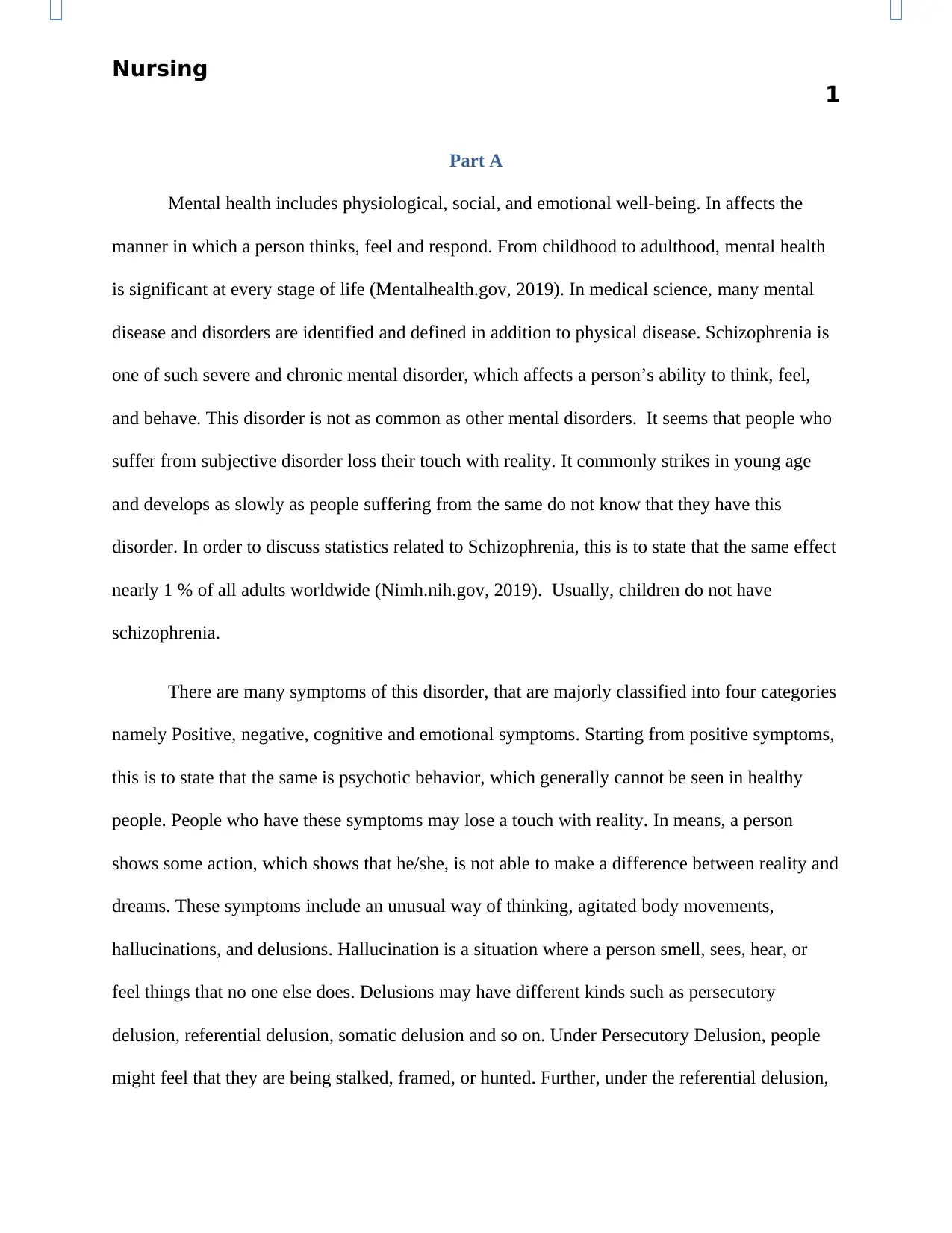
Nursing
1
Part A
Mental health includes physiological, social, and emotional well-being. In affects the
manner in which a person thinks, feel and respond. From childhood to adulthood, mental health
is significant at every stage of life (Mentalhealth.gov, 2019). In medical science, many mental
disease and disorders are identified and defined in addition to physical disease. Schizophrenia is
one of such severe and chronic mental disorder, which affects a person’s ability to think, feel,
and behave. This disorder is not as common as other mental disorders. It seems that people who
suffer from subjective disorder loss their touch with reality. It commonly strikes in young age
and develops as slowly as people suffering from the same do not know that they have this
disorder. In order to discuss statistics related to Schizophrenia, this is to state that the same effect
nearly 1 % of all adults worldwide (Nimh.nih.gov, 2019). Usually, children do not have
schizophrenia.
There are many symptoms of this disorder, that are majorly classified into four categories
namely Positive, negative, cognitive and emotional symptoms. Starting from positive symptoms,
this is to state that the same is psychotic behavior, which generally cannot be seen in healthy
people. People who have these symptoms may lose a touch with reality. In means, a person
shows some action, which shows that he/she, is not able to make a difference between reality and
dreams. These symptoms include an unusual way of thinking, agitated body movements,
hallucinations, and delusions. Hallucination is a situation where a person smell, sees, hear, or
feel things that no one else does. Delusions may have different kinds such as persecutory
delusion, referential delusion, somatic delusion and so on. Under Persecutory Delusion, people
might feel that they are being stalked, framed, or hunted. Further, under the referential delusion,
1
Part A
Mental health includes physiological, social, and emotional well-being. In affects the
manner in which a person thinks, feel and respond. From childhood to adulthood, mental health
is significant at every stage of life (Mentalhealth.gov, 2019). In medical science, many mental
disease and disorders are identified and defined in addition to physical disease. Schizophrenia is
one of such severe and chronic mental disorder, which affects a person’s ability to think, feel,
and behave. This disorder is not as common as other mental disorders. It seems that people who
suffer from subjective disorder loss their touch with reality. It commonly strikes in young age
and develops as slowly as people suffering from the same do not know that they have this
disorder. In order to discuss statistics related to Schizophrenia, this is to state that the same effect
nearly 1 % of all adults worldwide (Nimh.nih.gov, 2019). Usually, children do not have
schizophrenia.
There are many symptoms of this disorder, that are majorly classified into four categories
namely Positive, negative, cognitive and emotional symptoms. Starting from positive symptoms,
this is to state that the same is psychotic behavior, which generally cannot be seen in healthy
people. People who have these symptoms may lose a touch with reality. In means, a person
shows some action, which shows that he/she, is not able to make a difference between reality and
dreams. These symptoms include an unusual way of thinking, agitated body movements,
hallucinations, and delusions. Hallucination is a situation where a person smell, sees, hear, or
feel things that no one else does. Delusions may have different kinds such as persecutory
delusion, referential delusion, somatic delusion and so on. Under Persecutory Delusion, people
might feel that they are being stalked, framed, or hunted. Further, under the referential delusion,
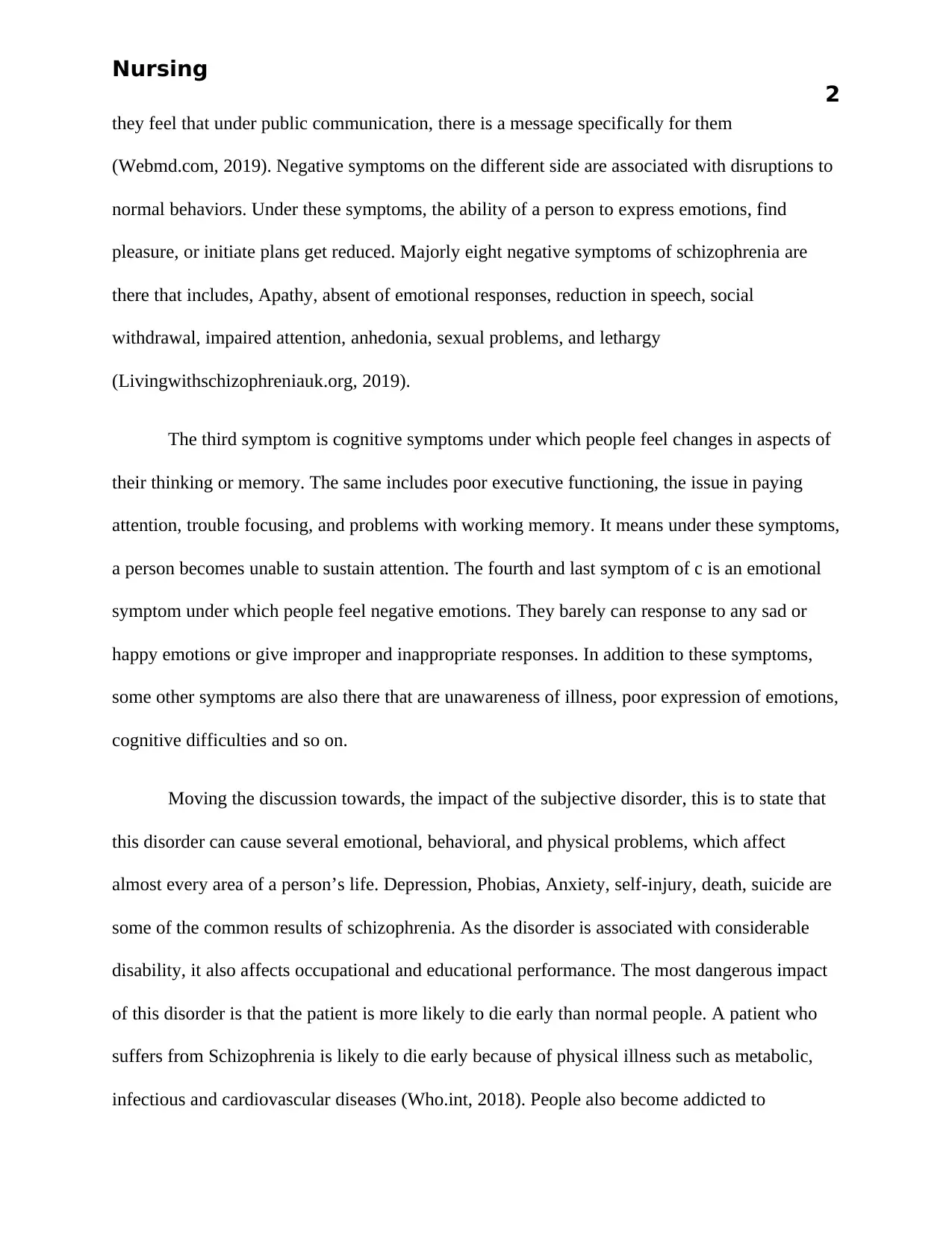
Nursing
2
they feel that under public communication, there is a message specifically for them
(Webmd.com, 2019). Negative symptoms on the different side are associated with disruptions to
normal behaviors. Under these symptoms, the ability of a person to express emotions, find
pleasure, or initiate plans get reduced. Majorly eight negative symptoms of schizophrenia are
there that includes, Apathy, absent of emotional responses, reduction in speech, social
withdrawal, impaired attention, anhedonia, sexual problems, and lethargy
(Livingwithschizophreniauk.org, 2019).
The third symptom is cognitive symptoms under which people feel changes in aspects of
their thinking or memory. The same includes poor executive functioning, the issue in paying
attention, trouble focusing, and problems with working memory. It means under these symptoms,
a person becomes unable to sustain attention. The fourth and last symptom of c is an emotional
symptom under which people feel negative emotions. They barely can response to any sad or
happy emotions or give improper and inappropriate responses. In addition to these symptoms,
some other symptoms are also there that are unawareness of illness, poor expression of emotions,
cognitive difficulties and so on.
Moving the discussion towards, the impact of the subjective disorder, this is to state that
this disorder can cause several emotional, behavioral, and physical problems, which affect
almost every area of a person’s life. Depression, Phobias, Anxiety, self-injury, death, suicide are
some of the common results of schizophrenia. As the disorder is associated with considerable
disability, it also affects occupational and educational performance. The most dangerous impact
of this disorder is that the patient is more likely to die early than normal people. A patient who
suffers from Schizophrenia is likely to die early because of physical illness such as metabolic,
infectious and cardiovascular diseases (Who.int, 2018). People also become addicted to
2
they feel that under public communication, there is a message specifically for them
(Webmd.com, 2019). Negative symptoms on the different side are associated with disruptions to
normal behaviors. Under these symptoms, the ability of a person to express emotions, find
pleasure, or initiate plans get reduced. Majorly eight negative symptoms of schizophrenia are
there that includes, Apathy, absent of emotional responses, reduction in speech, social
withdrawal, impaired attention, anhedonia, sexual problems, and lethargy
(Livingwithschizophreniauk.org, 2019).
The third symptom is cognitive symptoms under which people feel changes in aspects of
their thinking or memory. The same includes poor executive functioning, the issue in paying
attention, trouble focusing, and problems with working memory. It means under these symptoms,
a person becomes unable to sustain attention. The fourth and last symptom of c is an emotional
symptom under which people feel negative emotions. They barely can response to any sad or
happy emotions or give improper and inappropriate responses. In addition to these symptoms,
some other symptoms are also there that are unawareness of illness, poor expression of emotions,
cognitive difficulties and so on.
Moving the discussion towards, the impact of the subjective disorder, this is to state that
this disorder can cause several emotional, behavioral, and physical problems, which affect
almost every area of a person’s life. Depression, Phobias, Anxiety, self-injury, death, suicide are
some of the common results of schizophrenia. As the disorder is associated with considerable
disability, it also affects occupational and educational performance. The most dangerous impact
of this disorder is that the patient is more likely to die early than normal people. A patient who
suffers from Schizophrenia is likely to die early because of physical illness such as metabolic,
infectious and cardiovascular diseases (Who.int, 2018). People also become addicted to
⊘ This is a preview!⊘
Do you want full access?
Subscribe today to unlock all pages.

Trusted by 1+ million students worldwide
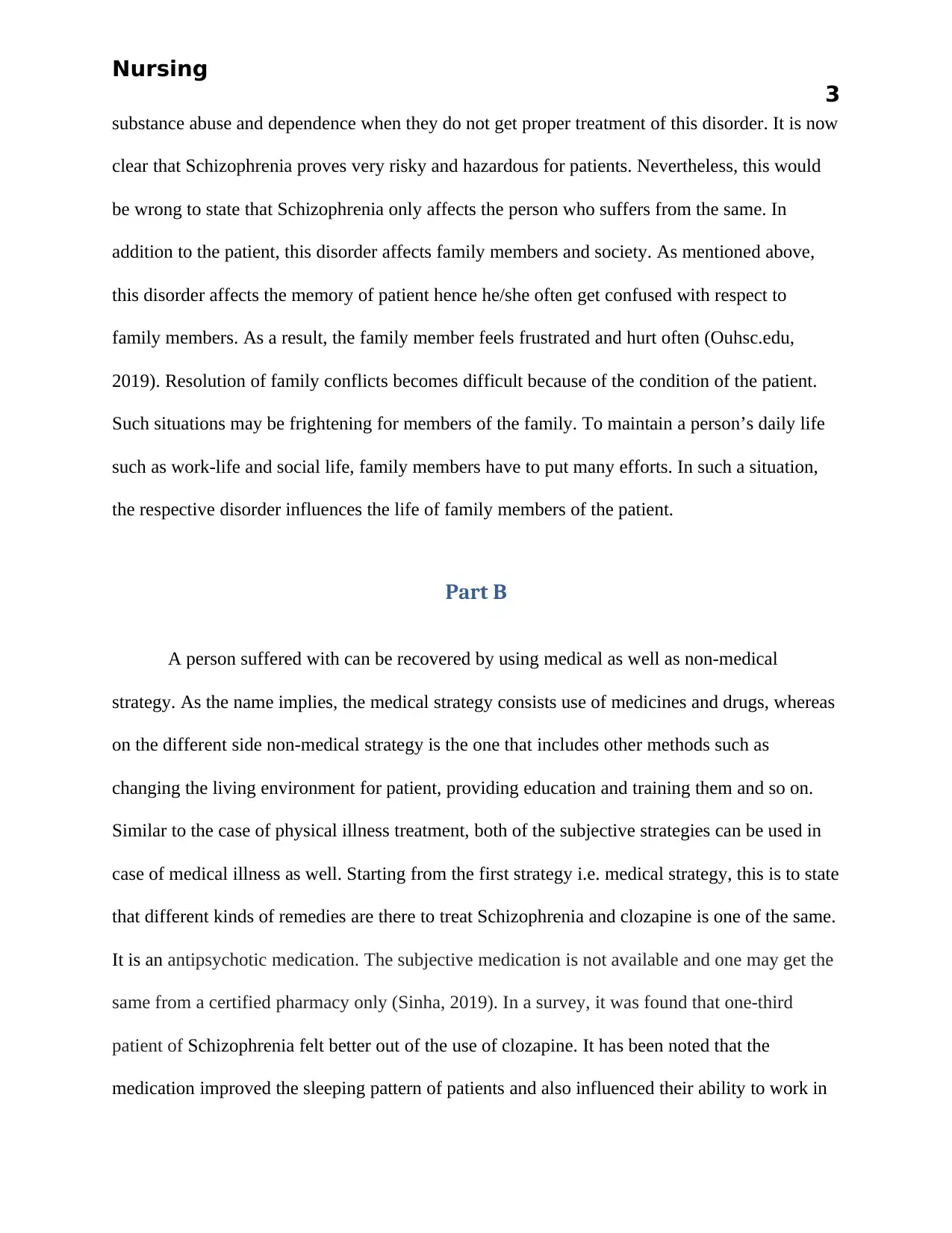
Nursing
3
substance abuse and dependence when they do not get proper treatment of this disorder. It is now
clear that Schizophrenia proves very risky and hazardous for patients. Nevertheless, this would
be wrong to state that Schizophrenia only affects the person who suffers from the same. In
addition to the patient, this disorder affects family members and society. As mentioned above,
this disorder affects the memory of patient hence he/she often get confused with respect to
family members. As a result, the family member feels frustrated and hurt often (Ouhsc.edu,
2019). Resolution of family conflicts becomes difficult because of the condition of the patient.
Such situations may be frightening for members of the family. To maintain a person’s daily life
such as work-life and social life, family members have to put many efforts. In such a situation,
the respective disorder influences the life of family members of the patient.
Part B
A person suffered with can be recovered by using medical as well as non-medical
strategy. As the name implies, the medical strategy consists use of medicines and drugs, whereas
on the different side non-medical strategy is the one that includes other methods such as
changing the living environment for patient, providing education and training them and so on.
Similar to the case of physical illness treatment, both of the subjective strategies can be used in
case of medical illness as well. Starting from the first strategy i.e. medical strategy, this is to state
that different kinds of remedies are there to treat Schizophrenia and clozapine is one of the same.
It is an antipsychotic medication. The subjective medication is not available and one may get the
same from a certified pharmacy only (Sinha, 2019). In a survey, it was found that one-third
patient of Schizophrenia felt better out of the use of clozapine. It has been noted that the
medication improved the sleeping pattern of patients and also influenced their ability to work in
3
substance abuse and dependence when they do not get proper treatment of this disorder. It is now
clear that Schizophrenia proves very risky and hazardous for patients. Nevertheless, this would
be wrong to state that Schizophrenia only affects the person who suffers from the same. In
addition to the patient, this disorder affects family members and society. As mentioned above,
this disorder affects the memory of patient hence he/she often get confused with respect to
family members. As a result, the family member feels frustrated and hurt often (Ouhsc.edu,
2019). Resolution of family conflicts becomes difficult because of the condition of the patient.
Such situations may be frightening for members of the family. To maintain a person’s daily life
such as work-life and social life, family members have to put many efforts. In such a situation,
the respective disorder influences the life of family members of the patient.
Part B
A person suffered with can be recovered by using medical as well as non-medical
strategy. As the name implies, the medical strategy consists use of medicines and drugs, whereas
on the different side non-medical strategy is the one that includes other methods such as
changing the living environment for patient, providing education and training them and so on.
Similar to the case of physical illness treatment, both of the subjective strategies can be used in
case of medical illness as well. Starting from the first strategy i.e. medical strategy, this is to state
that different kinds of remedies are there to treat Schizophrenia and clozapine is one of the same.
It is an antipsychotic medication. The subjective medication is not available and one may get the
same from a certified pharmacy only (Sinha, 2019). In a survey, it was found that one-third
patient of Schizophrenia felt better out of the use of clozapine. It has been noted that the
medication improved the sleeping pattern of patients and also influenced their ability to work in
Paraphrase This Document
Need a fresh take? Get an instant paraphrase of this document with our AI Paraphraser
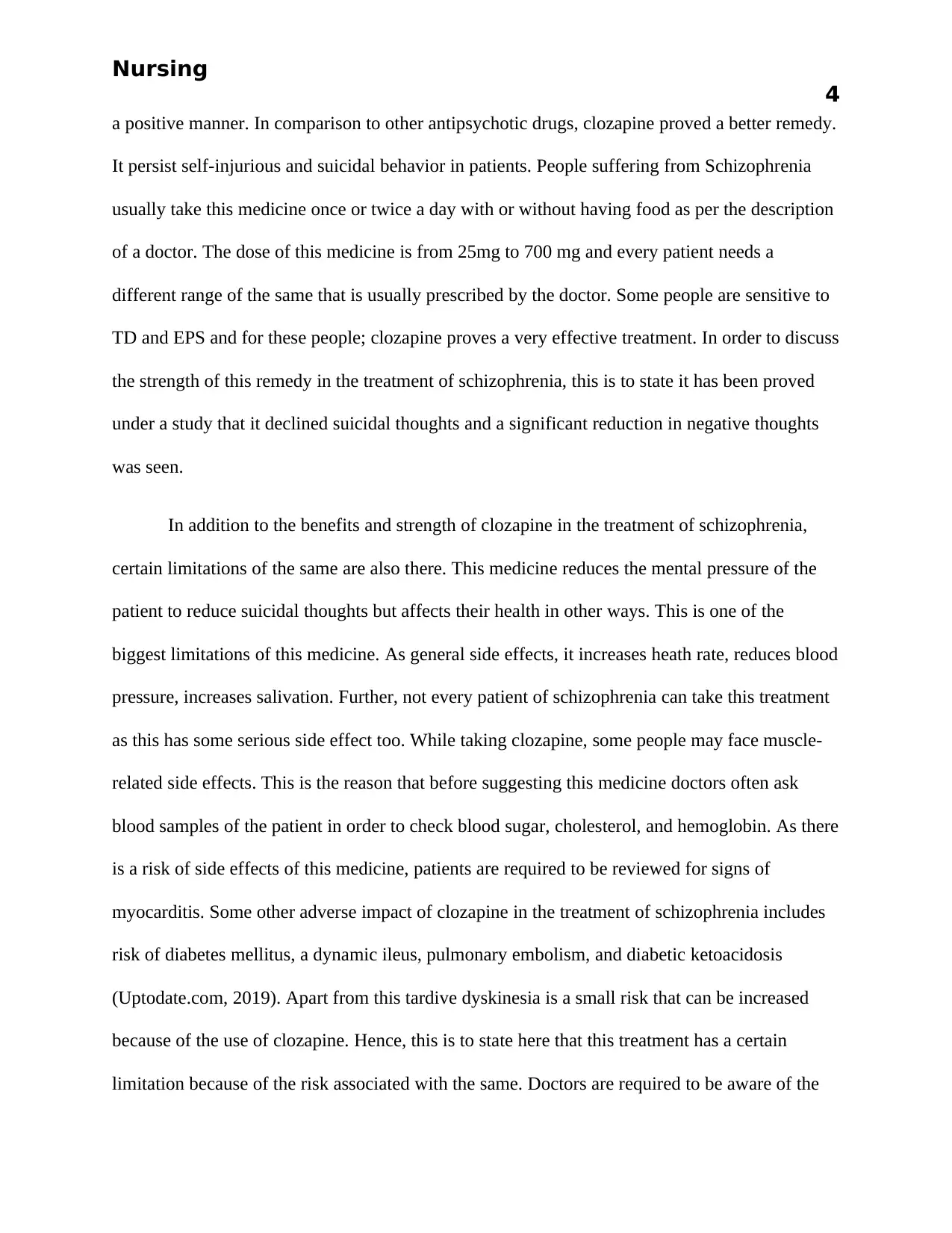
Nursing
4
a positive manner. In comparison to other antipsychotic drugs, clozapine proved a better remedy.
It persist self-injurious and suicidal behavior in patients. People suffering from Schizophrenia
usually take this medicine once or twice a day with or without having food as per the description
of a doctor. The dose of this medicine is from 25mg to 700 mg and every patient needs a
different range of the same that is usually prescribed by the doctor. Some people are sensitive to
TD and EPS and for these people; clozapine proves a very effective treatment. In order to discuss
the strength of this remedy in the treatment of schizophrenia, this is to state it has been proved
under a study that it declined suicidal thoughts and a significant reduction in negative thoughts
was seen.
In addition to the benefits and strength of clozapine in the treatment of schizophrenia,
certain limitations of the same are also there. This medicine reduces the mental pressure of the
patient to reduce suicidal thoughts but affects their health in other ways. This is one of the
biggest limitations of this medicine. As general side effects, it increases heath rate, reduces blood
pressure, increases salivation. Further, not every patient of schizophrenia can take this treatment
as this has some serious side effect too. While taking clozapine, some people may face muscle-
related side effects. This is the reason that before suggesting this medicine doctors often ask
blood samples of the patient in order to check blood sugar, cholesterol, and hemoglobin. As there
is a risk of side effects of this medicine, patients are required to be reviewed for signs of
myocarditis. Some other adverse impact of clozapine in the treatment of schizophrenia includes
risk of diabetes mellitus, a dynamic ileus, pulmonary embolism, and diabetic ketoacidosis
(Uptodate.com, 2019). Apart from this tardive dyskinesia is a small risk that can be increased
because of the use of clozapine. Hence, this is to state here that this treatment has a certain
limitation because of the risk associated with the same. Doctors are required to be aware of the
4
a positive manner. In comparison to other antipsychotic drugs, clozapine proved a better remedy.
It persist self-injurious and suicidal behavior in patients. People suffering from Schizophrenia
usually take this medicine once or twice a day with or without having food as per the description
of a doctor. The dose of this medicine is from 25mg to 700 mg and every patient needs a
different range of the same that is usually prescribed by the doctor. Some people are sensitive to
TD and EPS and for these people; clozapine proves a very effective treatment. In order to discuss
the strength of this remedy in the treatment of schizophrenia, this is to state it has been proved
under a study that it declined suicidal thoughts and a significant reduction in negative thoughts
was seen.
In addition to the benefits and strength of clozapine in the treatment of schizophrenia,
certain limitations of the same are also there. This medicine reduces the mental pressure of the
patient to reduce suicidal thoughts but affects their health in other ways. This is one of the
biggest limitations of this medicine. As general side effects, it increases heath rate, reduces blood
pressure, increases salivation. Further, not every patient of schizophrenia can take this treatment
as this has some serious side effect too. While taking clozapine, some people may face muscle-
related side effects. This is the reason that before suggesting this medicine doctors often ask
blood samples of the patient in order to check blood sugar, cholesterol, and hemoglobin. As there
is a risk of side effects of this medicine, patients are required to be reviewed for signs of
myocarditis. Some other adverse impact of clozapine in the treatment of schizophrenia includes
risk of diabetes mellitus, a dynamic ileus, pulmonary embolism, and diabetic ketoacidosis
(Uptodate.com, 2019). Apart from this tardive dyskinesia is a small risk that can be increased
because of the use of clozapine. Hence, this is to state here that this treatment has a certain
limitation because of the risk associated with the same. Doctors are required to be aware of the
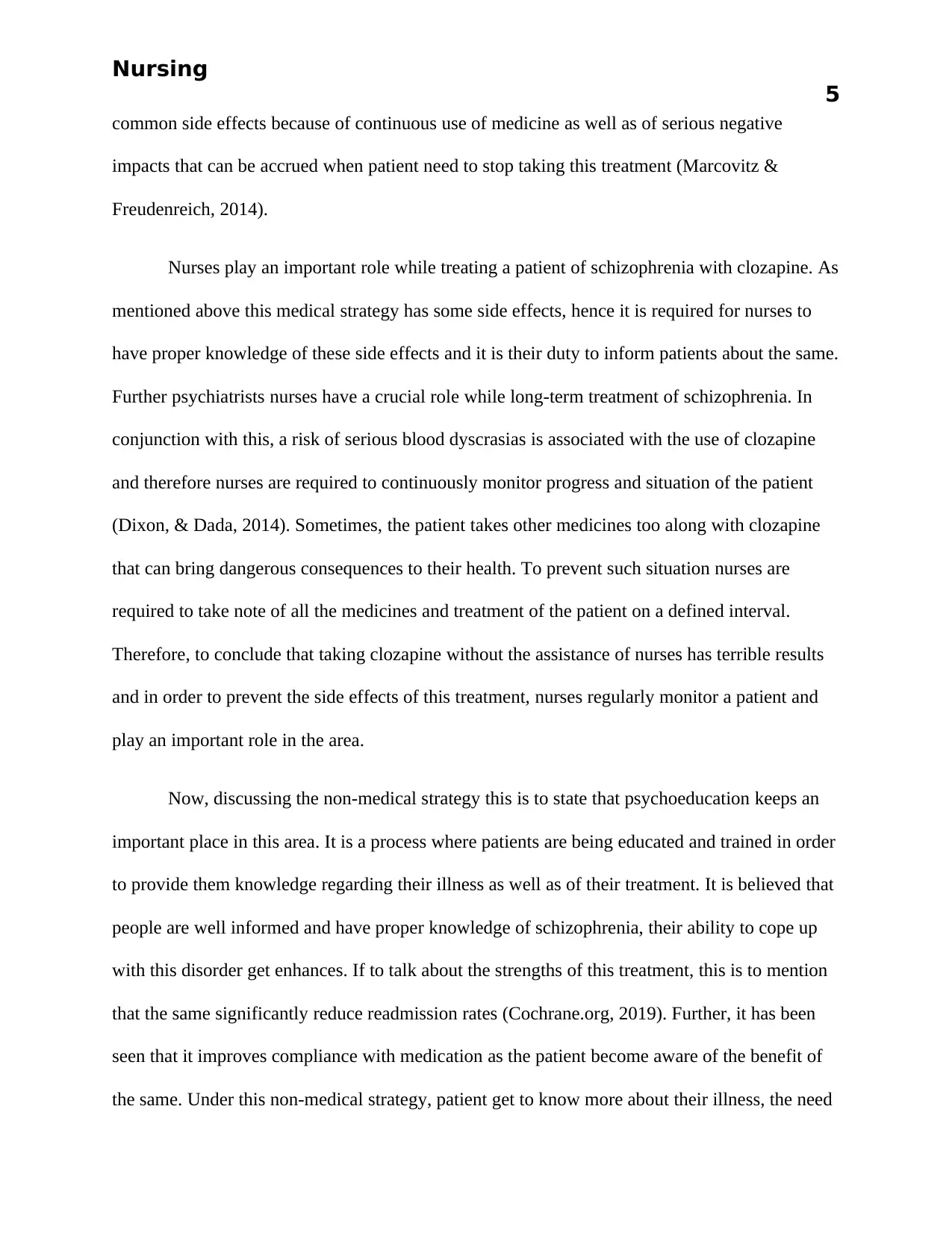
Nursing
5
common side effects because of continuous use of medicine as well as of serious negative
impacts that can be accrued when patient need to stop taking this treatment (Marcovitz &
Freudenreich, 2014).
Nurses play an important role while treating a patient of schizophrenia with clozapine. As
mentioned above this medical strategy has some side effects, hence it is required for nurses to
have proper knowledge of these side effects and it is their duty to inform patients about the same.
Further psychiatrists nurses have a crucial role while long-term treatment of schizophrenia. In
conjunction with this, a risk of serious blood dyscrasias is associated with the use of clozapine
and therefore nurses are required to continuously monitor progress and situation of the patient
(Dixon, & Dada, 2014). Sometimes, the patient takes other medicines too along with clozapine
that can bring dangerous consequences to their health. To prevent such situation nurses are
required to take note of all the medicines and treatment of the patient on a defined interval.
Therefore, to conclude that taking clozapine without the assistance of nurses has terrible results
and in order to prevent the side effects of this treatment, nurses regularly monitor a patient and
play an important role in the area.
Now, discussing the non-medical strategy this is to state that psychoeducation keeps an
important place in this area. It is a process where patients are being educated and trained in order
to provide them knowledge regarding their illness as well as of their treatment. It is believed that
people are well informed and have proper knowledge of schizophrenia, their ability to cope up
with this disorder get enhances. If to talk about the strengths of this treatment, this is to mention
that the same significantly reduce readmission rates (Cochrane.org, 2019). Further, it has been
seen that it improves compliance with medication as the patient become aware of the benefit of
the same. Under this non-medical strategy, patient get to know more about their illness, the need
5
common side effects because of continuous use of medicine as well as of serious negative
impacts that can be accrued when patient need to stop taking this treatment (Marcovitz &
Freudenreich, 2014).
Nurses play an important role while treating a patient of schizophrenia with clozapine. As
mentioned above this medical strategy has some side effects, hence it is required for nurses to
have proper knowledge of these side effects and it is their duty to inform patients about the same.
Further psychiatrists nurses have a crucial role while long-term treatment of schizophrenia. In
conjunction with this, a risk of serious blood dyscrasias is associated with the use of clozapine
and therefore nurses are required to continuously monitor progress and situation of the patient
(Dixon, & Dada, 2014). Sometimes, the patient takes other medicines too along with clozapine
that can bring dangerous consequences to their health. To prevent such situation nurses are
required to take note of all the medicines and treatment of the patient on a defined interval.
Therefore, to conclude that taking clozapine without the assistance of nurses has terrible results
and in order to prevent the side effects of this treatment, nurses regularly monitor a patient and
play an important role in the area.
Now, discussing the non-medical strategy this is to state that psychoeducation keeps an
important place in this area. It is a process where patients are being educated and trained in order
to provide them knowledge regarding their illness as well as of their treatment. It is believed that
people are well informed and have proper knowledge of schizophrenia, their ability to cope up
with this disorder get enhances. If to talk about the strengths of this treatment, this is to mention
that the same significantly reduce readmission rates (Cochrane.org, 2019). Further, it has been
seen that it improves compliance with medication as the patient become aware of the benefit of
the same. Under this non-medical strategy, patient get to know more about their illness, the need
⊘ This is a preview!⊘
Do you want full access?
Subscribe today to unlock all pages.

Trusted by 1+ million students worldwide
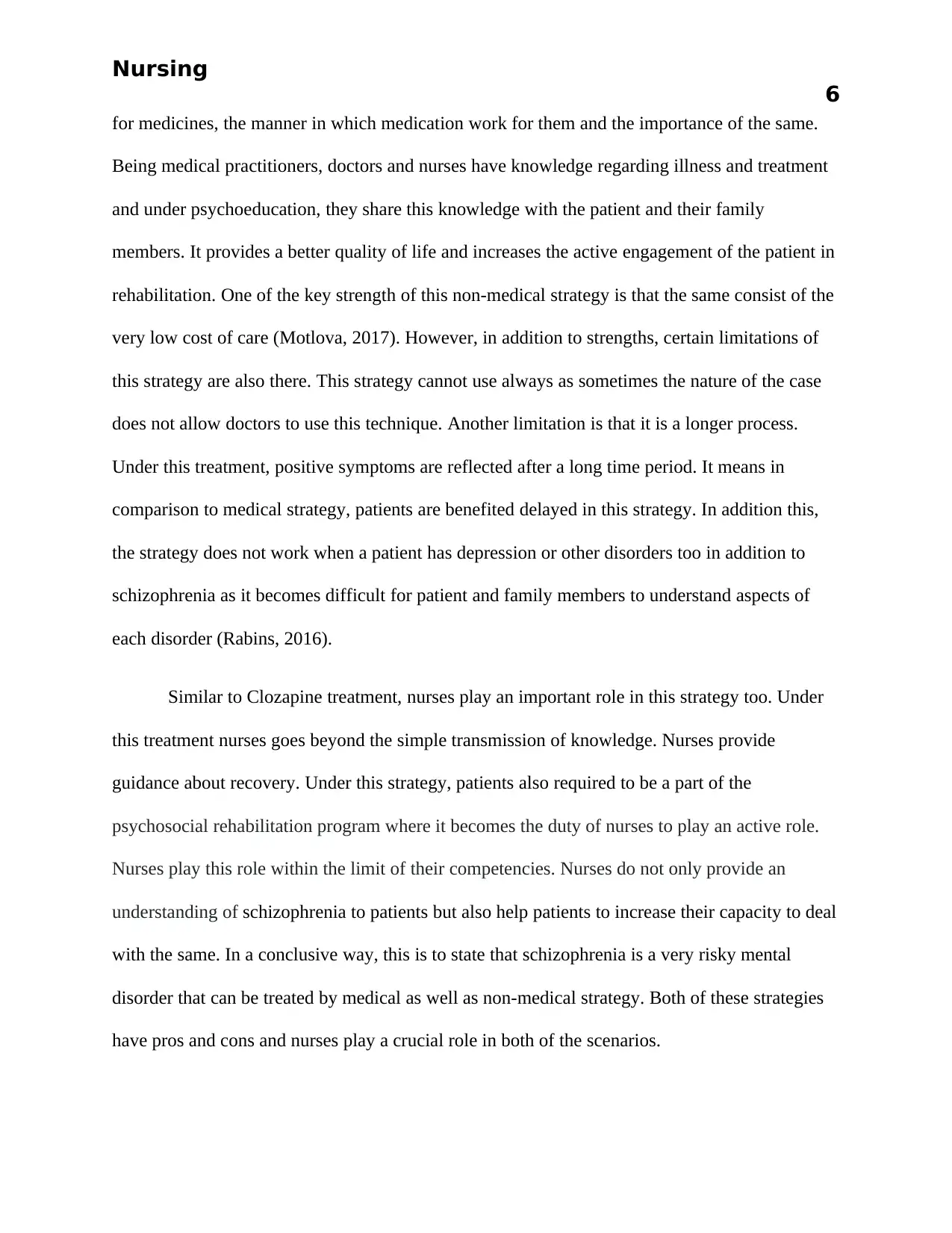
Nursing
6
for medicines, the manner in which medication work for them and the importance of the same.
Being medical practitioners, doctors and nurses have knowledge regarding illness and treatment
and under psychoeducation, they share this knowledge with the patient and their family
members. It provides a better quality of life and increases the active engagement of the patient in
rehabilitation. One of the key strength of this non-medical strategy is that the same consist of the
very low cost of care (Motlova, 2017). However, in addition to strengths, certain limitations of
this strategy are also there. This strategy cannot use always as sometimes the nature of the case
does not allow doctors to use this technique. Another limitation is that it is a longer process.
Under this treatment, positive symptoms are reflected after a long time period. It means in
comparison to medical strategy, patients are benefited delayed in this strategy. In addition this,
the strategy does not work when a patient has depression or other disorders too in addition to
schizophrenia as it becomes difficult for patient and family members to understand aspects of
each disorder (Rabins, 2016).
Similar to Clozapine treatment, nurses play an important role in this strategy too. Under
this treatment nurses goes beyond the simple transmission of knowledge. Nurses provide
guidance about recovery. Under this strategy, patients also required to be a part of the
psychosocial rehabilitation program where it becomes the duty of nurses to play an active role.
Nurses play this role within the limit of their competencies. Nurses do not only provide an
understanding of schizophrenia to patients but also help patients to increase their capacity to deal
with the same. In a conclusive way, this is to state that schizophrenia is a very risky mental
disorder that can be treated by medical as well as non-medical strategy. Both of these strategies
have pros and cons and nurses play a crucial role in both of the scenarios.
6
for medicines, the manner in which medication work for them and the importance of the same.
Being medical practitioners, doctors and nurses have knowledge regarding illness and treatment
and under psychoeducation, they share this knowledge with the patient and their family
members. It provides a better quality of life and increases the active engagement of the patient in
rehabilitation. One of the key strength of this non-medical strategy is that the same consist of the
very low cost of care (Motlova, 2017). However, in addition to strengths, certain limitations of
this strategy are also there. This strategy cannot use always as sometimes the nature of the case
does not allow doctors to use this technique. Another limitation is that it is a longer process.
Under this treatment, positive symptoms are reflected after a long time period. It means in
comparison to medical strategy, patients are benefited delayed in this strategy. In addition this,
the strategy does not work when a patient has depression or other disorders too in addition to
schizophrenia as it becomes difficult for patient and family members to understand aspects of
each disorder (Rabins, 2016).
Similar to Clozapine treatment, nurses play an important role in this strategy too. Under
this treatment nurses goes beyond the simple transmission of knowledge. Nurses provide
guidance about recovery. Under this strategy, patients also required to be a part of the
psychosocial rehabilitation program where it becomes the duty of nurses to play an active role.
Nurses play this role within the limit of their competencies. Nurses do not only provide an
understanding of schizophrenia to patients but also help patients to increase their capacity to deal
with the same. In a conclusive way, this is to state that schizophrenia is a very risky mental
disorder that can be treated by medical as well as non-medical strategy. Both of these strategies
have pros and cons and nurses play a crucial role in both of the scenarios.
Paraphrase This Document
Need a fresh take? Get an instant paraphrase of this document with our AI Paraphraser
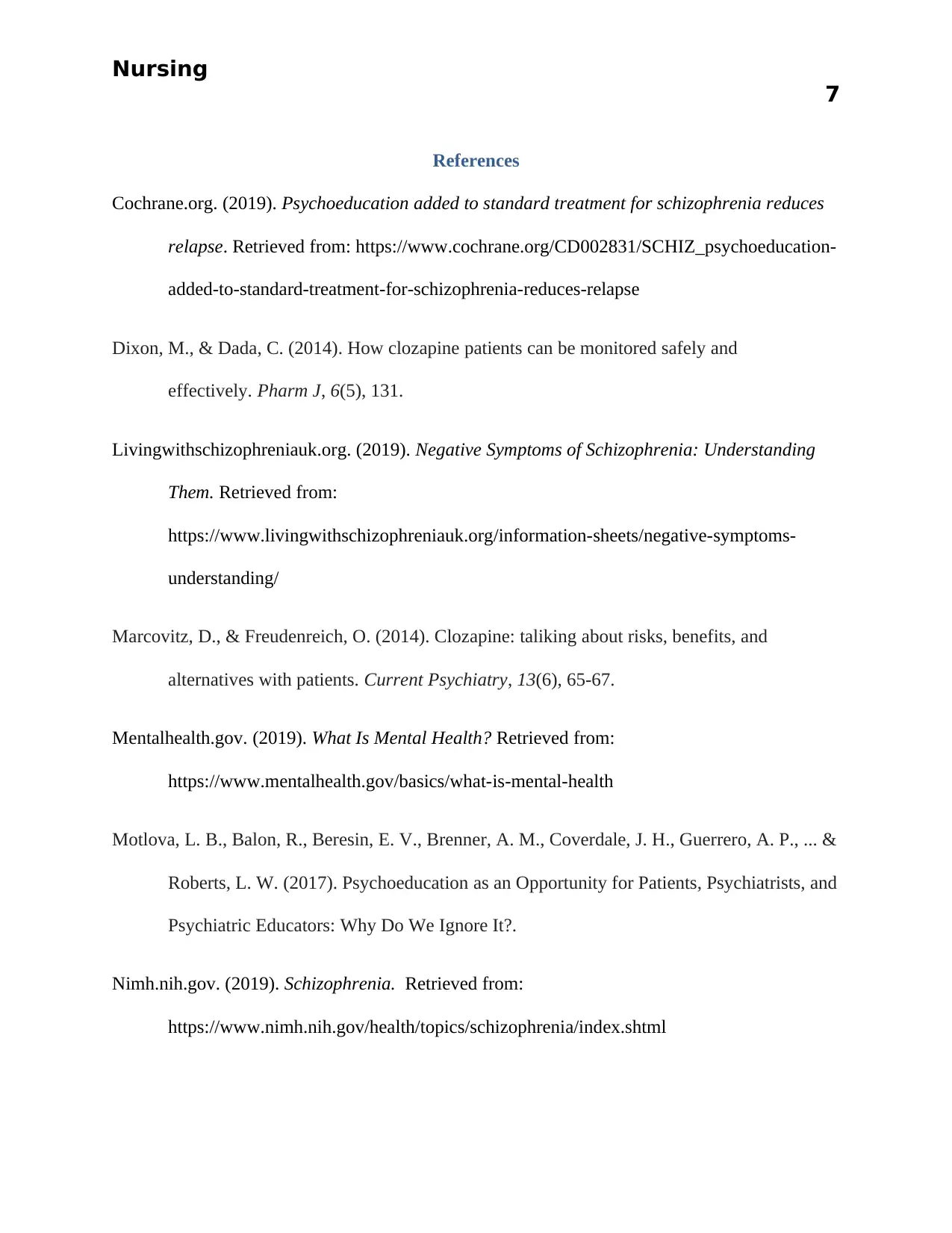
Nursing
7
References
Cochrane.org. (2019). Psychoeducation added to standard treatment for schizophrenia reduces
relapse. Retrieved from: https://www.cochrane.org/CD002831/SCHIZ_psychoeducation-
added-to-standard-treatment-for-schizophrenia-reduces-relapse
Dixon, M., & Dada, C. (2014). How clozapine patients can be monitored safely and
effectively. Pharm J, 6(5), 131.
Livingwithschizophreniauk.org. (2019). Negative Symptoms of Schizophrenia: Understanding
Them. Retrieved from:
https://www.livingwithschizophreniauk.org/information-sheets/negative-symptoms-
understanding/
Marcovitz, D., & Freudenreich, O. (2014). Clozapine: taliking about risks, benefits, and
alternatives with patients. Current Psychiatry, 13(6), 65-67.
Mentalhealth.gov. (2019). What Is Mental Health? Retrieved from:
https://www.mentalhealth.gov/basics/what-is-mental-health
Motlova, L. B., Balon, R., Beresin, E. V., Brenner, A. M., Coverdale, J. H., Guerrero, A. P., ... &
Roberts, L. W. (2017). Psychoeducation as an Opportunity for Patients, Psychiatrists, and
Psychiatric Educators: Why Do We Ignore It?.
Nimh.nih.gov. (2019). Schizophrenia. Retrieved from:
https://www.nimh.nih.gov/health/topics/schizophrenia/index.shtml
7
References
Cochrane.org. (2019). Psychoeducation added to standard treatment for schizophrenia reduces
relapse. Retrieved from: https://www.cochrane.org/CD002831/SCHIZ_psychoeducation-
added-to-standard-treatment-for-schizophrenia-reduces-relapse
Dixon, M., & Dada, C. (2014). How clozapine patients can be monitored safely and
effectively. Pharm J, 6(5), 131.
Livingwithschizophreniauk.org. (2019). Negative Symptoms of Schizophrenia: Understanding
Them. Retrieved from:
https://www.livingwithschizophreniauk.org/information-sheets/negative-symptoms-
understanding/
Marcovitz, D., & Freudenreich, O. (2014). Clozapine: taliking about risks, benefits, and
alternatives with patients. Current Psychiatry, 13(6), 65-67.
Mentalhealth.gov. (2019). What Is Mental Health? Retrieved from:
https://www.mentalhealth.gov/basics/what-is-mental-health
Motlova, L. B., Balon, R., Beresin, E. V., Brenner, A. M., Coverdale, J. H., Guerrero, A. P., ... &
Roberts, L. W. (2017). Psychoeducation as an Opportunity for Patients, Psychiatrists, and
Psychiatric Educators: Why Do We Ignore It?.
Nimh.nih.gov. (2019). Schizophrenia. Retrieved from:
https://www.nimh.nih.gov/health/topics/schizophrenia/index.shtml
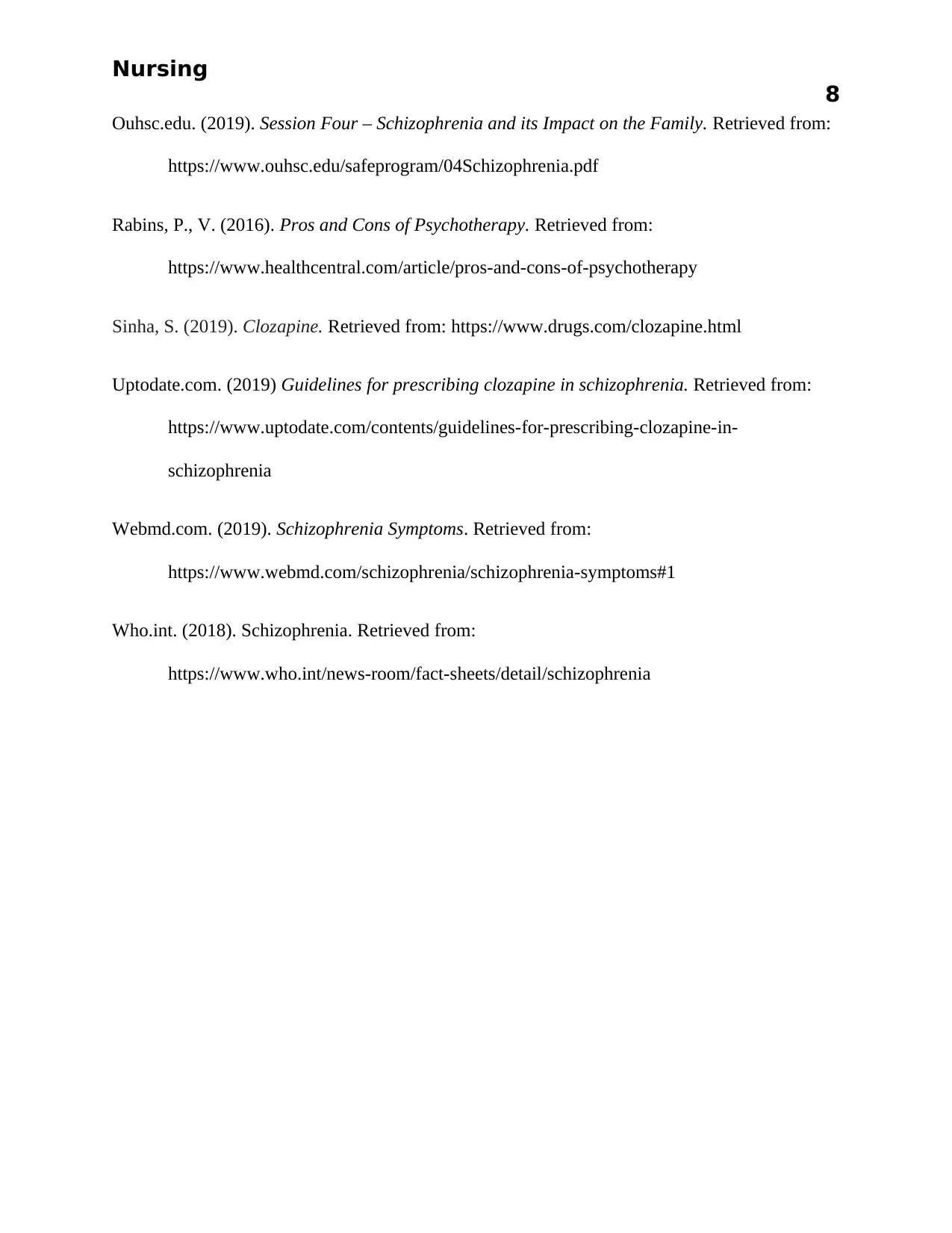
Nursing
8
Ouhsc.edu. (2019). Session Four – Schizophrenia and its Impact on the Family. Retrieved from:
https://www.ouhsc.edu/safeprogram/04Schizophrenia.pdf
Rabins, P., V. (2016). Pros and Cons of Psychotherapy. Retrieved from:
https://www.healthcentral.com/article/pros-and-cons-of-psychotherapy
Sinha, S. (2019). Clozapine. Retrieved from: https://www.drugs.com/clozapine.html
Uptodate.com. (2019) Guidelines for prescribing clozapine in schizophrenia. Retrieved from:
https://www.uptodate.com/contents/guidelines-for-prescribing-clozapine-in-
schizophrenia
Webmd.com. (2019). Schizophrenia Symptoms. Retrieved from:
https://www.webmd.com/schizophrenia/schizophrenia-symptoms#1
Who.int. (2018). Schizophrenia. Retrieved from:
https://www.who.int/news-room/fact-sheets/detail/schizophrenia
8
Ouhsc.edu. (2019). Session Four – Schizophrenia and its Impact on the Family. Retrieved from:
https://www.ouhsc.edu/safeprogram/04Schizophrenia.pdf
Rabins, P., V. (2016). Pros and Cons of Psychotherapy. Retrieved from:
https://www.healthcentral.com/article/pros-and-cons-of-psychotherapy
Sinha, S. (2019). Clozapine. Retrieved from: https://www.drugs.com/clozapine.html
Uptodate.com. (2019) Guidelines for prescribing clozapine in schizophrenia. Retrieved from:
https://www.uptodate.com/contents/guidelines-for-prescribing-clozapine-in-
schizophrenia
Webmd.com. (2019). Schizophrenia Symptoms. Retrieved from:
https://www.webmd.com/schizophrenia/schizophrenia-symptoms#1
Who.int. (2018). Schizophrenia. Retrieved from:
https://www.who.int/news-room/fact-sheets/detail/schizophrenia
⊘ This is a preview!⊘
Do you want full access?
Subscribe today to unlock all pages.

Trusted by 1+ million students worldwide
1 out of 9
Related Documents
Your All-in-One AI-Powered Toolkit for Academic Success.
+13062052269
info@desklib.com
Available 24*7 on WhatsApp / Email
![[object Object]](/_next/static/media/star-bottom.7253800d.svg)
Unlock your academic potential
Copyright © 2020–2025 A2Z Services. All Rights Reserved. Developed and managed by ZUCOL.





